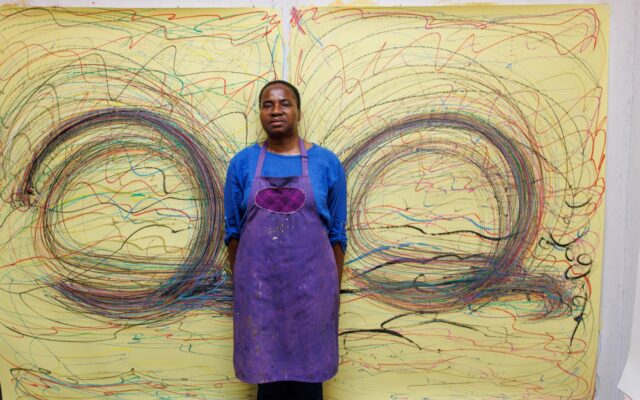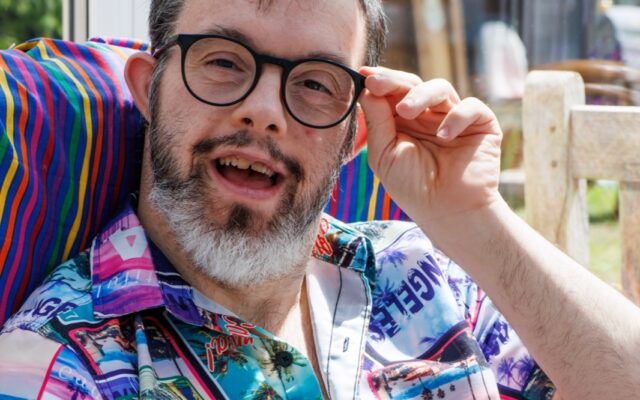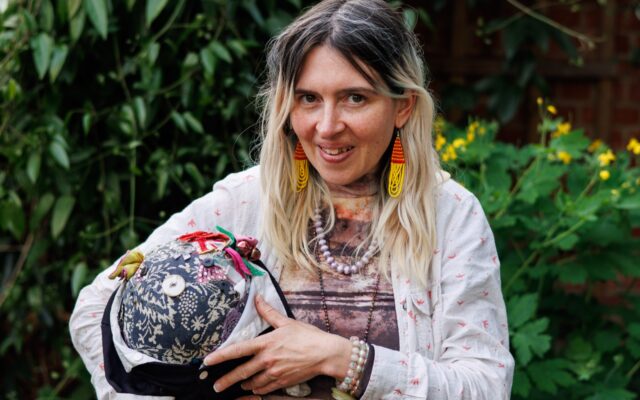Giving a strong voice for England
In the first of a new series of interviews with prominent people Seán Kelly talked to Gary Bourlet about the work of People First England which he founded just over a year ago with Kaliya Franklin.
People First groups have been around for some time but only recently has there been a national organisation. People First England was launched in January 2014 with support from the Housing and Support Alliance and Choice Support, among others. A little over a year later I went along to meet Gary Bourlet who, with Kaliya Franklin, was behind the launch, to find out how People First England is going and what they have been doing so far.
Gary met me with Michelle Stewart who describes herself as Gary’s personal assistant, “or whatever”. Michelle joins in with our discussion at various points.
Gary is a friendly man with an easy-going approach which does not hide a deep commitment. He is still expressing his disgust over the last government’s performance during their five-year term as assessed by 2,000 people with learning disabilities and their supporters. “It’s shocking. They got 2 out of 10,” he says. The survey was co-ordinated by the Learning Disability Alliance (LDa) of which People First England is a founder member. Is there anything he would like to pick out from the findings, I ask Gary, but he shakes his head. “All of it. There are 50 ‘wrongs’ on there. And there are some which weren’t included, transport for example. That’s not the LDa’s fault. It’s because there are so many things people want to talk about. Another omission was about people starting up their own businesses. Employment is a big issue.”
Gary wants the LDa findings to set an agenda for the next government: “It’s important that it carries on, into the council and European elections”.
The survey also covered the future of Assessment and Treatment Units such as Winterbourne View. Since the report’s publication the Chief Executive of the NHS stated that these units have to close. I ask Gary if he has any faith in the statement. “I don’t have any faith at all. It’s taken too long. We’ll probably be talking about it for the next ten years. Nothing has been put in place. What we need is to replace those units with Community Learning Disability Nurses. And advocates. The funding must go to that”. Gary says he will shortly be speaking to the government to point out how much the units currently cost and how much could be saved by the LDa proposals.
We discuss Valuing People. “I really thought we were getting somewhere but then we got the Coalition and they said we are not going to have it anymore. We had a very good tsar in Scott Watkins, a man with learning disabilities who now works at Seeability. When it came time to step down from Valuing People he was in tears. He had a put a lot into it. People easily forget what people like myself and Scott do. We just get forgotten”.
Gary says the cuts are short-sighted. “Now they are cutting funding for the National Forum which feeds into the government and do an absolutely good job. It’s a shame”. He feels that the government cuts support for people with learning disabilities because they are the easy choice. “It’s much easier to cut funding for people with disabilities, especially people with learning disabilities, than it is for the rich or pensioners because that is vote-winning. It’s all to do with votes and not enough people with learning difficulties vote. On my Facebook page there are a lot of people with learning disabilities saying, ‘No one is going to listen to us’. They accept defeat too easily”. But Gary does not accept defeat: “The government needs to work with people with learning disabilities. Our slogan is Nothing About Us Without Us!”
People First England have plans to get people with learning disabilities to feature more prominently in the media. “We haven’t been able to start that yet as we need funding for it. We need £20,000 for people to do the training. It can’t be Kaliya and me because we’ve got full-on stuff already. We want to get people with learning disabilities to work in the media interviewing politicians. We want them doing IT work, camera and sound, writing articles, being journalists. We want people spending time with MPs on internships, to see what they do, to give people the idea, then perhaps in future councils will take people with learning disabilities on as councillors. I hope too that we will have some MPs with learning disabilities”. Gary makes a comparison with the Suffragettes. “They were building up women’s rights. We’re talking about the same thing”.
People First England’s great need at the moment is for funding. Housing and Support Alliance and Choice Support and others have supported the first year but more income is needed now and they are working on bids. Gary has also set up a Just-Giving page which has already brought in some helpful individual donations.
Gary shares the job and the wage with Kaliya Franklin, author of the well-known blog with the ironic title “Benefit Scrounging Scum”. Kaliya does not have learning disabilities and I ask Gary what she brings. “She is a disability rights activist. She gives us another dimension. I am the sort of person who flies out with lots of ideas, you know, change-the-world ideas. She will say, hang on a minute, you’ve got to walk before you can run. She brings me back down to earth. But we get on fine. She is helping us get funding which is very important. She is somebody I could not work without.”
I ask Gary about how People First England relates to local groups. A number of self-advocacy groups have had to close recently and People First England aims to be an umbrella group. How is that going? “At the moment we are part of the Housing and Support Alliance. We’re not a national charity yet. We’d like to be a national charity but you need the funding to do so. And it gets more political because a lot of local groups in England are still sceptical about a national group, unlike Scotland and Wales where they are coming together. We are building relationships with local People First groups”.
What can People First England offer local groups? “We can’t give them money. That’s what they’re looking for”. Could they advise them on how to get funding? “I would ask them to look at other self-advocacy groups. Go and visit each other and work together to think how to get funding… but don’t apply for local authority funding because it’s in short supply”.
Gary notes that some groups produce publications or DVDs and sell them or charge for training and suggests that is another way for groups to get income. “You need somebody to come and talk about how you can run a business and develop a business plan”. Is that the sort of thing People First England are thinking of being able to offer at some stage? “No, it’s not. Kaliya and I wouldn’t be able to do that on our own. It would need someone to come in, maybe from a charitable organisation, who could help do a business plan”. What is People First England offering to local groups? “We are trying to get out there and speak to politicians and ministers. This is what we have been mostly working on. We are meeting the Minister for Care and Support in two weeks time. And we have been interviewed on television and been part of the LDa”. At a more local level, People First England is creating a list of local self-advocates who can be called on when needed.
Gary recognises that not everyone will be satisfied. “There will be some people who are going to be disappointed and want us to do lots of things. I get inundated with loads of things people want me to do and I can’t do it”.
People First England has been active in social media with Facebook and Twitter, no surprise when they have a renowned blogger on the staff. That’s Gary himself of course. I wonder if it is difficult connecting with people with learning disabilities using these methods? Gary thinks that Twitter is effective. “You will get quite a few on there”. But he says there are many people with learning disabilities who don’t know how to use Facebook or who are kept away from it by staff in day centres or care homes because of concerns about their safety. Nevertheless, he believes the numbers of people with learning disabilities online are increasing and says Facebook can be a real lifeline to people who live independently.
What put him on the road to being an activist? “Back in 1982 a number of people with learning disabilities used to meet at National Mencap. We set up the Participation Forum Group. Some of us were from day centres, adult training centres they called them at the time. We weren’t happy”. Gary explains that he and others were doing a week’s work for “therapeutic earnings” of just £4 a week. “There was no minimum wage. We didn’t have any rights”. It wasn’t the earnings that were supposed to be therapeutic but the work: “…putting screws into plastic bags….” He lifts his eyes upwards. “…It goes back to the old days of the workhouse”.
John Hersov supported the group to have a voice. “I’m still in touch with him. He was my inspiration. He got me on the road”, Gary says, and with a laugh adds, “though I don’t think he’d like to be put on a pedestal!”.
In 1984 Gary visited America with John. “That’s when I started to bring the idea of the People First movement to this country”. If he could speak now to his younger self Gary tells me he would say, “You can achieve anything. Do not be afraid to speak up for yourself. You’ve got to make a future for yourself.”
His parting remark is that people do not say enough about their support. “I have had lots of people support me through the years and supporters do not get a mention. We owe a lot of respect to our supporters”.
We go outside for a photo and, as if to emphasise the point about recognising support, he puts an arm around Michelle’s shoulders for a joint photo.
After several decades Gary is still a brave man trying to make a better world. And as the editor of this magazine wrote in these pages a little while ago, he deserves our support.
www.seankellyphotos.com




